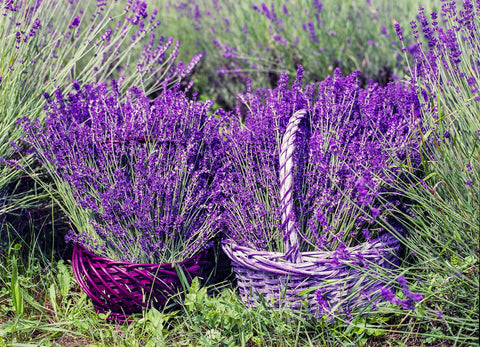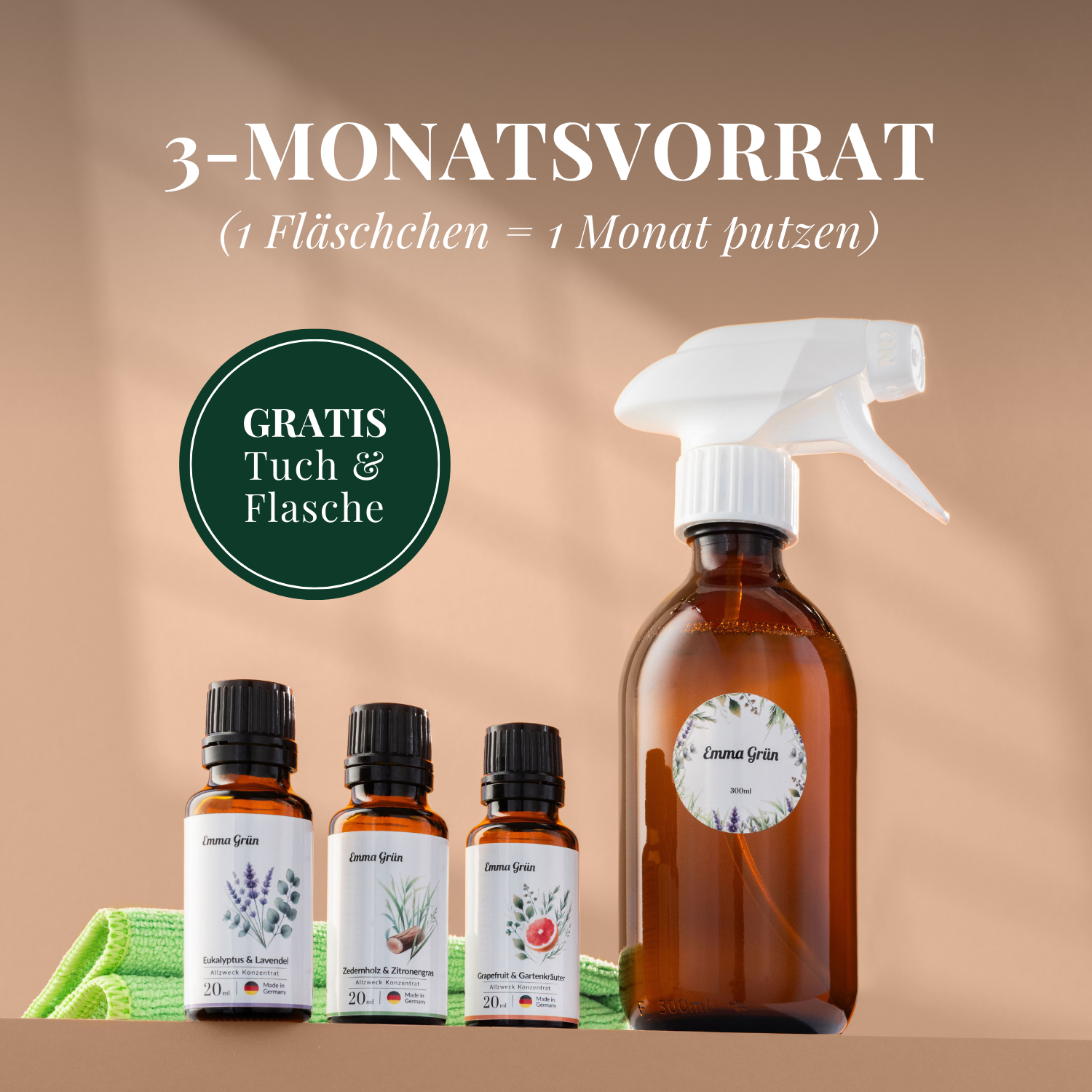Extracted from the fragrant flowers of the lavender plant, lavender oil is a versatile and natural oil that offers numerous benefits for your hair. The ancient Greeks and Romans already knew about the benefits of lavender and used it as a fragrance and to make soothing ointments.
Today, lavender oil is an indispensable part of the modern hair care industry and is a popular ingredient in shampoos, conditioners, hair masks and other hair care products and is appreciated by many people who prefer natural and herbal ingredients in their hair care. In the following guide, you will find interesting information on the extraction of lavender oil, its positive effects on hair and how you can use it safely and effectively.
How is lavender oil made?
High- quality lavender oil is mainly obtained through steam distillation . In this particularly gentle production process, the lavender flowers are placed in a special distillation chamber and the essential oils are extracted from the flowers using steam. The resulting steam is then cooled and condensed. In this process, the lavender oil separates from the water and is collected separately.
Lavender oil for hair: these are the benefits you can enjoy
Lavender oil is a wonderful all-rounder for your hair . Not only can it improve hair health , but it can also have a calming and relaxing effect on the mind . Integrate it into your hair care routine to benefit from the numerous advantages and pamper your hair naturally. The miracle oil has the following strengths and this is how its properties affect the health of your hair :
- Lavender oil promotes blood circulation in the scalp , which can stimulate hair growth.
- The calming and antimicrobial properties of lavender oil can help soothe the scalp and reduce hair loss .
- Lavender oil has antifungal properties that can help reduce dandruff and itching on the scalp .
- Lavender oil helps strengthen the hair structure and protect hair from damage caused by environmental influences and styling.
- Thanks to its calming effect, lavender oil can help with feelings of tension and scalp irritation .
Lavender oil for healthy and strong hair: 3 tips for use
Lavender oil is suitable for all hair types and can be used on wet and dry hair. Depending on your care routine, you have the following options:
1. Hair mask: Mix a few drops of lavender oil with a carrier oil such as jojoba or coconut oil. Gently massage the mixture into the scalp and distribute it evenly throughout the hair. Leave the mask on for at least 30 minutes and then rinse thoroughly.
2. Hair conditioner: Add a few drops of lavender oil to a bowl of water and use the solution as a natural hair conditioner after washing your hair.
3. Aromatherapy: Add a few drops of lavender oil to your shampoo or conditioner to enjoy the relaxing aromatherapy benefits while caring for your hair.
Emma Green tip: High-quality lavender oil is generally well tolerated. However , some people can be allergic to the essential oil . We therefore recommend that you carry out a tolerance test before use. And as mentioned before: never apply it undiluted to your skin! The essential components are simply too concentrated and could cause skin irritation.
Does lavender oil work against hair loss?
Lavender oil can help reduce or prevent hair loss , especially when it is caused by factors such as stress, inflammation or a damaged scalp. Please note that the positive effects of the oil may vary depending on the trigger and the stage of the hair problem, and therefore not all types of hair loss will produce the same results .

Image source: Pixabay
It is important to emphasize that lavender oil alone may not be enough to treat severe hair loss caused by genetic factors or hormonal problems. In such cases, it is advisable to consult a doctor or dermatologist to determine the underlying causes and receive appropriate treatment. However, in cases of mild hair loss, which can be caused by environmental factors, stress and incorrect styling , satisfactory results have been achieved by using lavender oil . The following properties make this possible:
- Circulation-promoting properties of lavender oil: By dilating the blood vessels, lavender oil can improve blood circulation in the scalp. The result: the hair follicles are better supplied with nutrients and hair growth is supported.
- Calming Effects of Lavender Oil: Stress and anxiety can lead to hair loss. Lavender oil has calming properties that can reduce tension and decrease hair loss.
- Anti-inflammatory properties of lavender oil: Inflammation on the scalp can lead to hair loss. Lavender oil has antimicrobial and anti-inflammatory properties that can help reduce irritation and soothe the skin.
- Antifungal Effects of Lavender Oil If hair loss is caused by a fungal infection of the scalp such as psoriasis, lavender oil with its antifungal properties can help in the treatment.
As mentioned above, you can use lavender oil in a variety of ways to improve the health of your hair. It does n't matter whether you use the essential oil as a hair mask or hair conditioner . To avoid scalp irritation, you should always dilute it with a carrier oil such as jojoba oil or almond oil.
Natural lavender oil: Why sustainability plays an important role in its production
To protect the environment and ensure that the lavender plants have been grown and harvested in a responsible and ethical manner, the following criteria should be ensured during production and distribution:
1. Organic farming: Make sure the lavender plants have been grown organically and without the use of chemical pesticides or herbicides. Instead, natural pest control methods and composting should be used to promote plant health and nourish the soil.
2. Harvest time: Lavender should be harvested at the right time: when the essential oils in the flowers are most concentrated . This is the only way to be sure that the lavender oil is of high quality.
3. Responsible harvesting practices: To protect the plants and their ecosystems, harvesting should be done gently by hand or using environmentally friendly methods .

Image source: Pixabay
4. Preserving biodiversity: Lavender is often grown in monocultures. To promote biodiversity, farmers can also plant other plant species and flowers in the area, creating habitats for various insects and animals.
5. Energy and water efficiency: Agricultural processes should be designed to minimize energy and water consumption. Efficient irrigation systems and sustainable energy sources can help reduce the ecological footprint .
6. Community support: The local community and farmers should be involved in lavender oil production and be fairly compensated. Social responsibility and fair trade practices are important aspects of production.
7. Processing and distillation: In order to save energy and reduce waste, it is important to pay attention to environmentally friendly technologies and processes during processing. Steam distillation, which is used in the production of sustainable lavender oil, is one of the environmentally friendly methods and also guarantees the extraction of high-quality oils .
8. Packaging and transport: Lavender oil should be packaged using environmentally friendly, i.e. recycled materials . In order to minimise CO₂ emissions , it is also important to ensure that transport is as efficient as possible.
Of course, it is not always possible for you as a consumer to follow all of the above points. However, just reading the small print will help you choose the right product. Only by following the above practices can the production of lavender oil be made more environmentally friendly and the long-term health of the lavender plants and their habitats be ensured. In addition , environmentally friendly cultivation methods have also been proven to improve the quality and effectiveness of lavender oil . It is therefore important for you as a consumer to look for products that are certified as sustainable and meet ethical standards.
Conclusion
Lavender oil is a natural, gentle and effective option for hair care. This means that the essential oil not only promotes the health of your hair. Due to its pleasant scent, it also increases your well-being and relieves tension. Therefore, it is absolutely worthwhile to integrate lavender oil into your hair care routine and use the various positive properties of the essential oil.
FAQ: Questions & Answers
How to apply lavender oil to hair?
Lavender oil can be used as a hair mask, hair rinse or in combination with shampoo and conditioner. However, to avoid possible skin irritation, the essential oil should always be diluted with a carrier oil.
Can I apply undiluted lavender oil directly to my scalp?
It is recommended to always dilute lavender oil with a carrier oil before applying it to the scalp. Too high a concentration of essential oil can irritate the skin.
How often should I use lavender oil on my hair?
The frequency of use depends on individual needs and the condition of the hair. Some people use lavender oil once or twice a week as part of their hair care routine.
Sources
- Lavender oil: possible uses – https://utopia.de/ratgeber/lavendeloel-wirkung-und-anwendung-des-aetherischen-oels/
- Lavender oil: effects & applications – https://www.brigitte.de/gesund/gesundheit/lavendeloel--wirkung-und-anwendung-11736026.html
- Lavender oil: application, effect & production – https://www.jolie.de/beauty/lavendeloel-anwendung-wirkung-und-herstellung-des-bluetenoels-206364.html
- Lavender oil: https://www.gesundfit.de/heilkraeuter-heilpflanzen/lavendeloel/
- Lavender oil against hair loss: https://totalhair.net/lavendeloel-gegen-haarausfall-diese-wirkung-hat-es-auf-die-haare/





